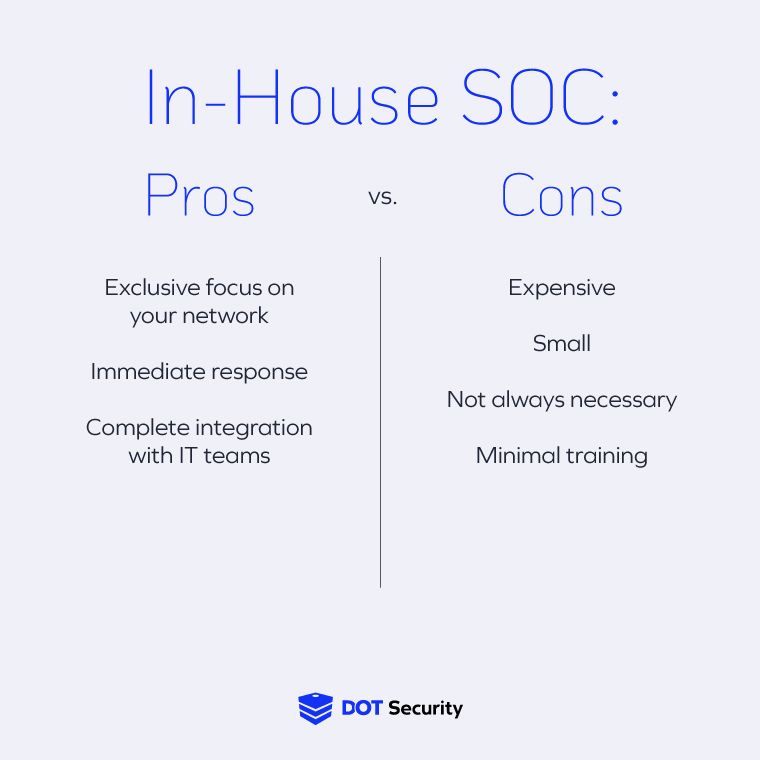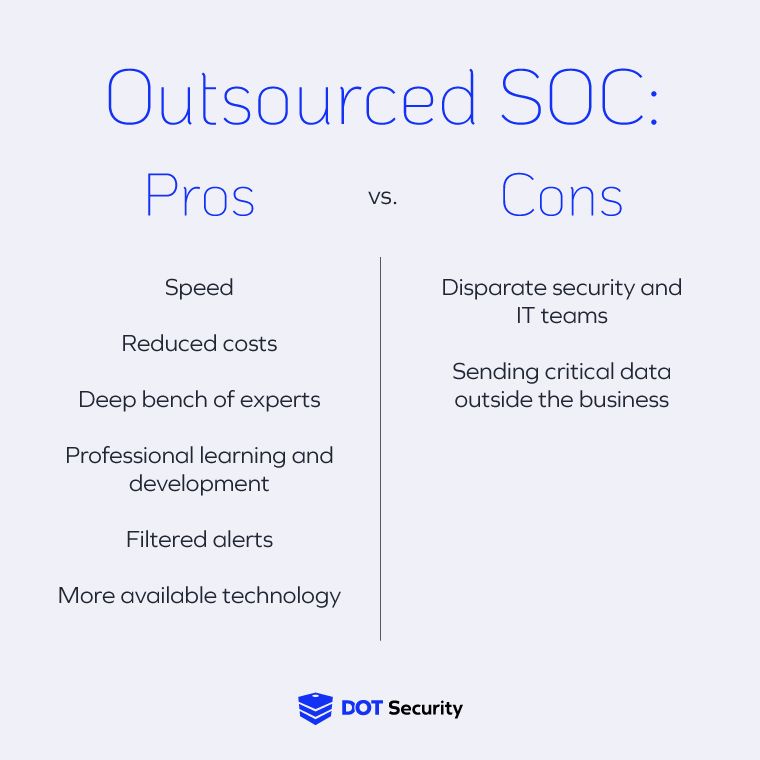Network Security Monitoring
In-House vs Outsourced SOC: Pros and Cons
November 10, 2022
8 minutes

DOT Security may offer a state-of-the-art Security Operations Center (SOC), but even we can acknowledge that it doesn’t make us the right choice for every business. In the managed security service provider (MSSP) vs in-house SOC debate, it can be hard to sort through the pros and cons with your business’ needs in mind.
That’s why we’ve put together this list for you to look through. It will help you decide whether you want to onboard your own security personnel or work with an MSSP.
Sign up for our newsletter!!
Watch the video above to get an idea of what the DOT Security SOC looks like, and read on to explore what you get from having an in-house team of cybersecurity professionals and how that compares to working with a top-tier security provider.
MSSP vs SOC
"MSSP vs SOC” is a slightly misguided idea, as these are not mutually exclusive. In fact, any good MSSP should have a SOC. Most people who ask about which is better either don’t know that or are thinking specifically of building an in-house SOC for their organization.
After all, an MSSP provides security services, and therefore, needs a center of operations from which to monitor networks and respond to threats. Meanwhile, a SOC can be part of either an MSSP or the location of a company division.
If you are one of those trying to decide between an MSSP and an in-house SOC, which one you should go with will depend on the size of your business, revenue, technological advancement, and overall cyber risk.
Need help sorting through all of these factors? Contact the experts at DOT Security to figure it out today.
In-House SOC
If you have a group of cybersecurity professionals onboarded as company employees, particularly if they all work together in one secure location, then you have an in-house SOC. While it’s expensive, there’s no better way to ensure that your business gets every ounce of the attention you could want to give it.

Cons
Expensive
Cybersecurity Analysts, depending on their experience, get paid $95,000-160,000. And if you want to have true 24/7 monitoring, you need a team of several analysts, as well as Penetration Testers to search for vulnerabilities in your system, CISOs to advise on your cybersecurity posture, and more.
And all of this is before you even factor in the cost of the equipment and software they’ll need for your layered cybersecurity strategy and the secure space they’ll need to operate in. The costs of hiring and training talent aren’t small, either. For some companies, the costs may be worth it, but it’s a considerable investment to make.
Small
Because of the cost of actually onboarding an in-house SOC team is so high, most of the time, these departments are as small as companies can make them. If you ever need to increase their workload or whenever one member of the team leaves, it becomes a considerable strain on your employees since there are fewer people to share the load.
Not Always Necessary
The idea of having constant, dedicated attention paid to just your network can be attractive, but is it actually necessary for your business? You don’t want to cut corners on your cybersecurity, but if you have a layered cybersecurity strategy in place and a team that performs regular monitoring, actual human eyes on your network 24/7 may just be extremely expensive overkill.
Minimal Training
Naturally, any dedicated employee will want to grow and move up in their career. However, when you have a small team, cybersecurity professionals will have fewer peers to talk to and learn from. It’s hard to focus on professional development when everyone is focused on protection and has fewer opportunities to grow.
Related Blog: The Importance of Cybersecurity Awareness, Training, and Education
Pros
Exclusive Focus on Your Network
You never have to worry about your cybersecurity professionals being distracted by another client when there’s a problem with your environment. An in-house SOC ensures that the problem will be detected and remediated as quickly as possible, minimizing the risk of any lasting damage to your business.
Immediate Response
An MSSP can be stacked with professionals who handle issues as quickly as possible, but even one that is fully staffed can only sort through so many alerts at once. Meanwhile, an in-house SOC will only ever have to focus on your alerts, and can immediately deal with or dismiss them as needed.
Complete Integration with IT Teams
There is often overlap between the responsibilities of IT and cybersecurity teams. When they both work under the same roof, it’s easier to collaborate on implementing new hardware and software, and align on security initiatives and the future of the company’s overall technology strategy.
Outsourced SOC
When you outsource your SOC to an MSSP like DOT Security, a group of external professionals are the ones dedicated to keeping your business safe. They won’t work specifically for your organization, and will have other clients as well, but it is impossible to beat the level of resources and experience they can bring to your security strategy.

Cons
Disparate Security and IT Teams
There is significant overlap in the Venn diagram of cybersecurity and IT security. While both teams ultimately have different focuses in mind, they work together on a number of major projects, including choosing and implementing new hardware and software. When those teams are completely separate, that collaboration becomes harder.
Sending Critical Data Outside the Business
It’s crucial to choose the right MSSP, because they’ll have access to some of your company's most sensitive information. Third-party vendors can be a significant source of risk, particularly if they don’t have the appropriate security controls. In fact, 19% of incidents can be attributed to them. A good SOC, even an outsourced one, should be reliable, but it still involves a significant loss of control.
Related Checklist: Vendor Cybersecurity to Avoid Third-Party Risks
Pros
Speed
If you want to onboard a security team as quickly as possible, there’s no better way to do it than outsourcing your SOC to an MSSP. It allows you to almost immediately begin implementing a cybersecurity strategy, so you don’t have to wait to find, interview, hire, and then train an entire team filled with the right talent.
Reduced Costs
As stated above, having a cybersecurity team in-house is not cheap. While the cost of any thorough layered strategy is less than the cost of being breached, it just makes good business sense to use your budget effectively rather than widely. You can get access to more experts and software more of the time for less money by working with an MSSP.
Deep Bench of Experts
Because an outsourced SOC will have a full staff of just cybersecurity personnel, you never have to worry about losing contact with experts. Members of your security team can leave the company or just go on vacation without creating a gap in your protection. Plus, you can benefit from a wider range of experience and opinions with so many industry insiders working together.
Professional Learning and Development
On the cutting edge of the cybersecurity field, MSSPs can conduct much more immediate, thorough, and helpful training sessions for their staff. No matter how much you believe in giving your in-house employees room to grow, nothing beats the experience that comes from working with other specialists. That makes the people who work in an outsourced SOC among the best in the world at what they do.
Filtered Alerts
Cybersecurity equipment is designed to send an alert any time it detects potentially suspicious activity. However, there is a lot of perfectly normal activity that sometimes just seems a little odd, and that can drown an in-house team in irrelevant and unnecessary alerts. An MSSP will sort through those for you, freeing up your time and only sending the ones that actually require your attention your way.
More Available Technology
Working all day every day in cybersecurity, the staff of an outsourced SOC knows what the latest and greatest innovations in the field are, and is likely to already have them to provide to clients. This far outpaces what an in-house team is capable of onboarding, as they are working with a much more limited cybersecurity budget.
Bottom Line
Every company is different, and some need the personalized attention afforded by an in-house SOC. However, if you’re not a large enterprise and don’t have the budget for one, or just want a team that is dedicated to staying on top of developments in the field, an outsourced MSSP could be right for you.
Clearly, both options have their pros and cons. The best way to find out which one aligns the most with your individual needs is to talk to an expert about how to create and fulfill an effective cybersecurity strategy.
Talk to a cybersecurity professional about your organization’s needs. Contact the specialists at DOT Security today.
